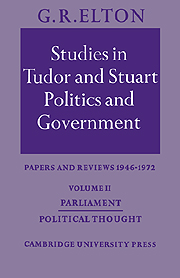32 - Reform by Statute: Thomas Starkey's Dialogue and Thomas Cromwell's Policy
Published online by Cambridge University Press: 23 December 2009
Summary
Not so long ago it was generally held that with Thomas More's death the light went out of English humanism and the intellectuals' share ended in the government of their country. Of late, however, the generation of younger humanists who started writing in the 1530s has attracted much attention and much favourable comment. The names of Elyot and Starkey, Morison and Taverner, if not yet quite household words among students, have at least become newly familiar to Reformation scholars. Professor Zeeveld has demonstrated the share that these men had in laying the intellectual foundations of the Church of England. Professor Ferguson has made a fine case for seeing in them a first generation of practical thinkers who wished to use their training in the cause of general reform. And Mr McConica has termed them Erasmians, whose influence he discovers in just about every thought and deed of that decade. It might be thought that these matters had earned a rest, for a while at least. However, it seems to me that in this discussion one distinctly central problem has been overlooked or at least very inadequately treated. We know that these men thought seriously and constructively about the nature of the state, that they regarded participation in government – counselling the king – to be the necessary duty of a scholar, and that they wished to reform the commonwealth.
- Type
- Chapter
- Information
- Studies in Tudor and Stuart Politics and GovernmentPapers and Reviews 1946–1972, pp. 236 - 258Publisher: Cambridge University PressPrint publication year: 1974



